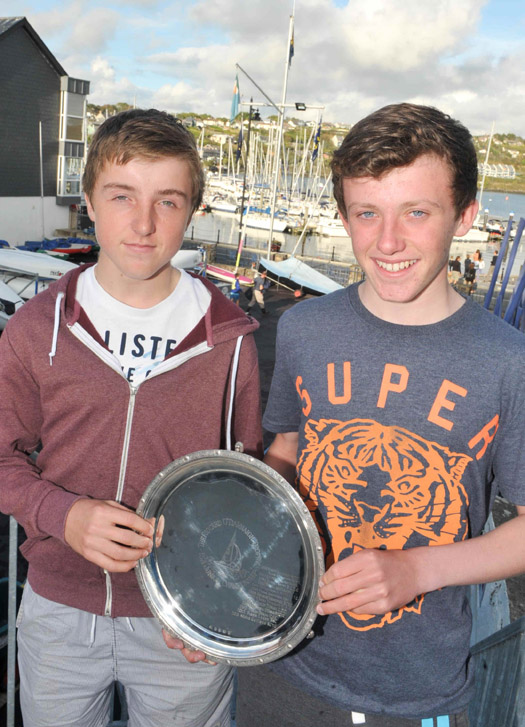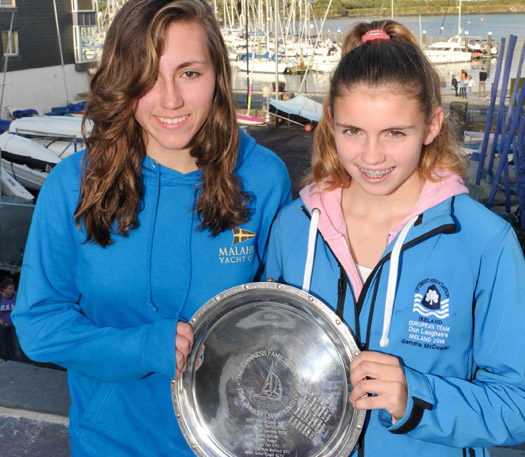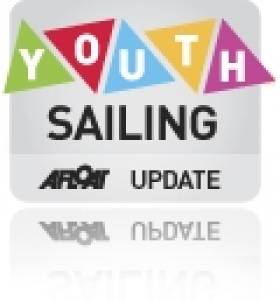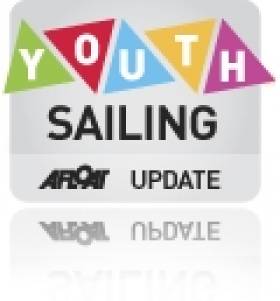Displaying items by tag: Youth Sailing,
Durcan Triumphs With All Ireland Junior Sailing Title Win in Kinsale
#youthsailing – Talented Royal Cork youth sailors made a clean sweep of the All Ireland Junior Helmsmans Championships off Kinsale yesterday. In an end of season boost just ahead of his solo assault on the Optimist Worlds in Argentina next month, Harry Durcan lifted the trophy in style, topping off a remarkable 1,2,3 result for Royal Cork Yacht Club.
Twenty sailors from nine classes and out of eleven clubs (including two wild cards) were chosen to compete this weekend out of Kinsale Yacht Club.
After patiently waiting again for wind the morning of day two, racing started at 12:30. Race five turned out to be hectic at the marks throughout the race with plenty of calling out by all. First over the line was Ros Morgan and Ronan Walsh of Skerries Sailing Club, followed by Clare Gorman and Amy Carrol of the National Yacht Club and third place Adam D'Arcy and James Hassett of Royal Cork Yacht Club.
Winds remained consistent for some reliable performance throughout race six with Peter McCann and Michael O'Suileabhain of Royal Cork Yacht Club coming first over the finish line on race six, the final preliminary race before choosing the top ten for the medal race.
Selection for the top ten resulting sailors to enter the medal race was calculated and six teams from Royal Cork Yacht Club made it through with one team from Malahide Yacht Club, National Yacht Club, Dingle Sailing Club and Kinsale Yacht Club.
The medal race (race 7) gave double points and the pressure was on to get a good start. James McCann and Michael Carrol of Royal Cork Yacht Club were ahead all the way with excellent mark rounding and good boat control that got them over the final line first. Fellow club members, Harry Durcan and Harry Whittaker, were close on their tail.

Harry Durcan and Harry Whittaker from Royal Cork Yacht Club were the overall winners

Gemma and Cara Mc Dowell from Malahide Yacht Club who won the Ladies Competition
The overall top three was:
• 1st Harry Durcan and Harry Whittaker of Royal Cork Yacht Club with 29 points.
• 2nd Peter McCann and Michael O'Suileabhain of Royal Cork Yacht Club with 32 points.
• 3rd Adam D'Arcy and James Hassett of Royal Yacht Club with 42 points.
Ladies Competition
• 1st Gemma McDowell and Cara McDowell of Malahide Yacht Club on 45 points.
Harry Durcan's next event he will be representing Ireland at the Optimist Worlds in Buenos Aires, Argentina. Harry will then be moving on to compete in 29ers in 2015.
|
Sail No |
Helm |
Class |
Crew |
Club |
Place |
R1 |
R2 |
R3 |
R4 |
R5 |
R6 |
M |
Points |
DSC |
NET |
|
12 |
Harry Durcan |
Wild Card |
Harry Whittaker |
Royal Cork YC |
1 |
3 |
3 |
1 |
3 |
7 |
6 |
6 |
29 |
7 |
22 |
|
4 |
Peter McCann |
International 420 |
Michael O'Suileabhain |
Royal Cork YC |
2 |
5 |
2 |
2 |
2 |
4 |
1 |
16 |
32 |
5 |
27 |
|
6 |
Adam D'Arcy |
Optimist |
James Hassett |
Royal Cork YC |
3 |
7 |
7 |
7 |
7 |
3 |
7 |
4 |
42 |
7 |
35 |
|
10 |
Gemma Mc Dowell |
Optimist |
Cara McDowell |
Malahide YC |
4 |
4 |
9 |
10 |
5 |
6 |
3 |
8 |
45 |
10 |
35 |
|
15 |
Seafra Guilfoyle |
Youth Worlds |
Conor Horgan |
Royal Cork YC |
5 |
6 |
1 |
11 |
4 |
8 |
2 |
14 |
46 |
11 |
35 |
|
3 |
James McCann |
Optimist |
Michael Carroll |
Royal Cork YC |
6 |
21 |
6 |
5 |
12 |
10 |
5 |
2 |
61 |
21 |
40 |
|
20 |
Clare Gorman |
Optimist |
Amy Carroll |
National YC |
7 |
9 |
4 |
21 |
6 |
2 |
14 |
12 |
68 |
21 |
47 |
|
5 |
Paddy Cunnane |
Topaz |
Adam Byrne |
Dingle SC |
8 |
8 |
10 |
9 |
21 |
5 |
8 |
10 |
71 |
21 |
50 |
|
16 |
Cliodhna NiShuillebhain |
International 420 |
Jill McGinley |
Kinsale YC |
9 |
1 |
14 |
6 |
1 |
12 |
12 |
18 |
64 |
14 |
50 |
|
13 |
Johnny Durcan |
Laser 4.7 |
Florence Lyden |
Royal Cork YC |
10 |
2 |
5 |
3 |
8 |
21 |
21 |
20 |
80 |
21 |
59 |
|
19 |
Rory Caslin |
Laser 4.7 |
Scott Levie |
National YC |
11 |
21 |
11 |
4 |
9 |
21 |
9 |
75 |
21 |
54 |
|
|
18 |
Shane McLoughlin |
Mirror |
Oscar Langan |
Sutton DC |
12 |
10 |
12 |
8 |
11 |
15 |
21 |
77 |
21 |
56 |
|
|
11 |
Ros Morgan |
Topper |
Ronan Walsh |
Skerries SC |
13 |
15 |
16 |
21 |
21 |
1 |
4 |
78 |
21 |
57 |
|
|
7 |
Stephen Craig |
RS 200 Youths |
Morgan Lyttle |
Royal St. George YC |
14 |
14 |
13 |
21 |
13 |
11 |
11 |
83 |
21 |
62 |
|
|
17 |
Triona Hinkson |
RS Feva |
Catherine Kelly |
Royal St. George YC |
15 |
16 |
15 |
12 |
10 |
13 |
21 |
87 |
21 |
66 |
|
|
1 |
Hugh Perette |
Topper |
Conor Kneafsey |
National YC |
16 |
18 |
19 |
21 |
14 |
9 |
10 |
91 |
21 |
70 |
|
|
8 |
Alison Dolan |
RS Feva |
Grainne Young |
Blessington SC |
17 |
12 |
18 |
21 |
21 |
14 |
15 |
101 |
21 |
80 |
|
|
14 |
Tiarnan Dickson |
Mirror |
Rory MacAllister |
Lough Ree YC |
18 |
11 |
20 |
21 |
21 |
17 |
13 |
103 |
21 |
82 |
|
|
2 |
Jack Kiely |
Topaz |
Joey Curran |
Dungarvan HSC |
19 |
21 |
8 |
21 |
21 |
18 |
16 |
105 |
21 |
84 |
|
|
9 |
David Johnston |
GP 14 Youth |
Meisha Johnston |
Sutton DC |
20 |
13 |
17 |
21 |
21 |
16 |
21 |
109 |
21 |
88 |
UCD Lead Student World Yachting Cup
UCD Ireland Sailing Team currently sit atop the leader board in La Rochelle.
Following last nights "Night Race" and this mornings Windward /Leeward the team now lie 6 points clear of the second placed Canadian team.
The five and a half hour night race came down to three way match race over the last three miles, with the French and Australian teams pushing UCD all the way to finish in a fraught tacking duel.
The team, buoyed by huge support from at home, now have a maximum of 4 more races to go in the series and are in a strong position in what has proven to be an incredibly competitive fleet.
With plenty of racing left UCD Team Ireland still have a lot to do if they want to bring home the Gold.
Team Captain Cathal Leigh Doyle adds:
Every race has been a dog fight. No result comes easy and no result is ever secure until we literally get the whistle on the finish line! Working from today backwards:
Today, 10 knots and flat water. We nailed our start line and as our tactician had planned, we secured the left hand side of the beat and played the shifts to the windward mark. We rounded in first place with the French defenders behind us. Downwind we had to play defensively as the French tried everything the could do roll us. Once again, our training over the last few weeks showed with us out gybing the French and leading to at the leeward mark. At the leeward, we rounded in first, the French in second and the USA in third. As we have learned over and over again since we arrived here, twenty meters of separation between two boats means both boats are in TOTALLY different wind. The USA climbed over the French and over us. We tacked back to try defend but by then it was too late. We held on to secure second with a late comeback from Italy. Just to show you how variable is it here, the defenders went from second place to seventh in that race.
In the inshore, the race committee decided to send us for a 21 nautical mile race (After a 28 nautical mile last night we were not too impressed). The race was effectively a huge windward/leeward race course. The wind had increased to 15 knots and this wind range we have found all week that we excel. The right side was favoured because the tide had turned and would lift us up to the first mark. We went right and were in great shape behind once again the French. However, Canada, Italy and England banged right and gained huge distance. Once around the first mark, it was a procession to the finish line so we secured the 4th place. Everyone is tired and the bodies are beginning to really ache.
Yesterday, was a roller coaster! Three windward/leeward races and one offshore night race. Again in the 15 knots breeze we had the edge on the fleet. Again however, the USA and Canadians were giving us nothing for free. In our first race after getting buried on the start line Aidan flicked the boat through the smallest of gaps and got us into clear air and the right side of the beat. We worked had all the way around and finished 3rd. In the next two races, Aidan and Barry nailed the start! We dominated from the start and finished the race with bullets. Aidan and Simon on mainsheet are really finding the different modes for sailing these yachts and enabling us to carve our way upwind. Downwind Barry is calling some amazing lines and getting us clear lanes.
The offshore race was interesting to say the least. We brought in our subs Ben and Ellen and Theo, Simon and Bella got a break for the night. We started well rounding the first mark in 5th and Aidan and Barry planned to go very low for the 5k downwind. It paid and we rounded the next mark in 3rd. For the next 4 hours it was match racing between us and Australia, France and the USA! We crossed the line and the others crossed within 30 seconds behind us so you can imagine how close it was. 5 hours of racing and we only confirmed our result on the final tack. Aidan excelled driving in the dark and once again, our bow man had a great day on the water making sure we looked good and all our moves went smoothly.
Ok its time for team debrief here so I have to bounce. Two days left, 12 races done and only maximum of 15 in this series so only 3 left. We want to bring the cup home but there is still a lot of sailing to be done!

























































